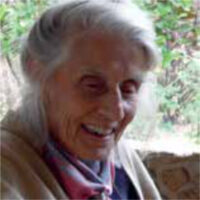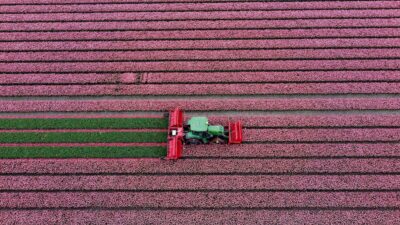Main content
Ankie Borgstein van Wijk lived on to just beyond the age of 93 and dedicated at least 60 years of her life to paediatrics and her small farm just outside Blantyre in Malawi.

Born in 1925, an only child of an eminent citizen from Gouda, Netherlands, she grew up a solitary child, rarely accompanying her parents on holiday, being sent instead to various summer camps.
After high school, she went on to study medicine in Utrecht, starting during the Second World War. Towards the end of the war, the university was closed but some of the lectures continued clandestinely, and she had to sit for exams at the professors’ homes.
Meanwhile she worked for the resistance, ferrying messages concealed under the saddle of her bicycle between various resistance cells. Had these been discovered, she would have been summarily executed. Her father spent several years during the war as a German hostage incarcerated in the local jail. Ten hostages were randomly selected and executed for every German soldier killed by the resistance, so her resistance work must have occasioned a great deal of soul-searching.
After the end of the war, she met fellow medical student Jan, who was to become her husband and the love of her life. She never fully recovered from his untimely death at the age of 52, though she outlived him by 39 years. They were married in 1951, and made plans both for a large family (7 sons in the space of 9 years), and for moving out of Europe. Chile as a first choice was discarded due to administrative restrictions, and their interest turned towards Africa. In early 1960, having finished his surgical training, Jan requested an appointment with the Undersecretary for Colonial Affairs in London.
The Foreign Office must have assumed he was a representative of the Dutch government, and they were slightly taken aback when he asked them for a job as a surgeon in Africa. But with the inimitable politeness and sangfroid of the British civil servant, the Undersecretary called in a minor official who dealt with postings, and they were able to offer him a choice between a district hospital in Nigeria or a central hospital post in what was then still known as Nyasaland. He immediately took the central hospital, though he admitted later that he had only the vaguest idea where Nyasaland was.
After a brief preparation, the couple loaded their worldly possessions, their 6 children, and their Citroën station wagon (with small camping trailer) onto a cargo boat bound for Cape Town. There were eight of us in a car for 3 passengers with two small folding seats in the back.
The 12-day boat journey was followed by an epic road trip from Cape Town to Johannesburg, Salisbury (Harare), Bulawayo, Tete in Portuguese East Africa (Mozambique) where we climbed up to see the recently discovered ancient rock paintings, and on into southern Nyasaland.
From there it was a day’s drive to Blantyre where my parents were to spend the rest of their lives. We arrived there late at night at the Ryall’s Hotel with six hungry children and only buttered toast and tea available from room service.
Jan was soon immersed in the busy work of surgical specialist at the Queen Elisabeth Central Hospital (QECH) in Blantyre, leaving the running of the house to Ankie. Their youngest child was born several months later at home in an ancient government house in the Sunnyside suburb of Blantyre. Jan delivered all his own children.
Several years later Malawi became independent, and fearing violence most of the British doctors left for Southern Rhodesia (not yet Zimbabwe). Jan took the unprecedented decision to remain in Malawi and try to keep the hospital going. He was to look after the surgical and obstetrics/gynaecology departments, while Ankie had to take over the medical wards (she was then not yet a specialist). A paediatric department as such did not exist yet, the ill children being admitted with their mothers to the female medical ward. They ran the 1000 bed hospital for several years between them, with the help of the nurses and medical assistants, until gradually the specialist positions were filled again.
Throughout this time, Ankie would make sure she was home when the seven of us returned walking from school. But after dinner, when we were asleep, she would often walk back to the hospital alone to see some patients or chat between cases with Jan, who, as the only surgeon in the country, frequently had to operate far into the night.
In her ‘spare time‘ and to keep us entertained in those days before television, she would also write and direct plays for us to perform on controversial subjects such as drug smuggling and gold fever. She never threw anything away, and I recently came across some of the original scripts while cleaning out some of my old schoolbooks that were still gathering dust in my room of the house she lived in for the rest of her life. Ankie had played the violin since she was at school, and in Malawi all the family members were ‘encouraged‘ to learn a musical instrument. Jan took up the clarinet, while the sons played piano, guitar, flute, trumpet accordion and various other instruments. Musical evenings were usually organised once every few weeks with other musical enthusiasts.
Having dedicated several years to largely self-taught paediatrics, she felt it was time to obtain some official qualifications, and she travelled to London to sit for the Diploma in Child Health of the Royal College of Physicians in 1969, and subsequently passed the very stringent fellowship exams of the South African college of medicine in 1975.
She singlehandedly set up the paediatric department at the QECH in Blantyre, and gradually built it up as one of the top departments in the hospital. In the early years of Malawi independence, she persuaded South Africa to offer 10 cardiac operations per year for patients with congenital heart problems, all expenses paid. With only a chest x-ray and a stethoscope accurate diagnoses had to be made (echocardiogram was not even on the horizon then), but I did not hear of any patient being returned without treatment because of an error in diagnosis.
Our medical education started as soon as we were able to follow the endless patient discussions at the dinner table.
After Jan’s untimely death while climbing the Mulanje mountain range, she was so utterly devastated that she was unable to talk about him for many years. She threw herself into her work and continued running the farm as she thought he would have liked. She had grown up as a city girl in Gouda and had very little previous experience in farming.
Her daily routine was up by dawn, prepare home-grown coffee, supervise the milking of the cows… then off to the hospital in her trusty Landrover, delivering milk to friends along the way.
Morning ward-rounds were followed by a quick coffee then out-patients until lunch. A snack in her office or a visit to a friend’s house was followed by further clinical work on the wards and, increasingly, teaching and supervision. Returning home at the end of the afternoon, she would have tea with whoever of her sons happened to be around at the time, and check on their schoolwork. Years later when I spent some weeks writing up my PhD dissertation, she would still check if I had spent the morning working and not lounging in a hammock in the garden.
After tea she would hold a free clinic for all the ill children of the surrounding villages; often between 20 and 30 children were seen before dark. One of her gardeners would tag along with a box of medicines, ointments and bandages provided by various donations.
Gradually, over the years, her sons all drifted off one by one to medical school in Europe, some returning to various jobs in Malawi, before moving off again for specialisation. Once a year she would embark on a whirlwind tour of the family, spending a few days with each of her sons in the various countries they were living in, before returning home to her farm.
She lived in the old house filled with books and memories. She read voraciously, often 40 to 50 books per year, keeping careful notes in her diary, always eager to discuss any recent book she had read. She looked up any unfamiliar words in an ancient dictionary, making a note of the meaning. Otherwise her life style was determinedly stoic: no unnecessary luxuries, with most of the food from her own farm and gardens. To her delight, the farm was mostly self-sufficient, energy being drawn from a batch of solar panels on the roof and used to power both water pumps and light in the house. Cooking and hot water came from an Aga stove in the kitchen, fired by wood carefully and sustainably harvested from the farm.
She worked until the age of 87, completing 50 years of service for the Malawi health ministry in 2012. Laterin her career she received numerous awards:
- a knighthood from the Netherlands in 1990
- an honorary doctorate from the Mzuzu University of Malawi in 2006
- the lifetime award of the Medical Association of Malawi in 2008
- and the order of ‘Grand Achiever of the Malawi Order of National Achievement‘ in 2013.
She continued teaching until she retired, and although a progressive hearing loss must have made the paediatric cardiac sounds particularly difficult to identify, she rarely made errors of diagnosis.
She disliked her increasing dependency as old age gradually began to take its toll, but remained living on her own. She maintained a keen interest in all the activities around the farm and those of friends and family as well as international politics.
She died some months after her 93rd birthday, body completely worn out, mind as sharp as ever.
BMJ Publishing Group Limited
Adapted with permission from BMJ 2019;3


















































